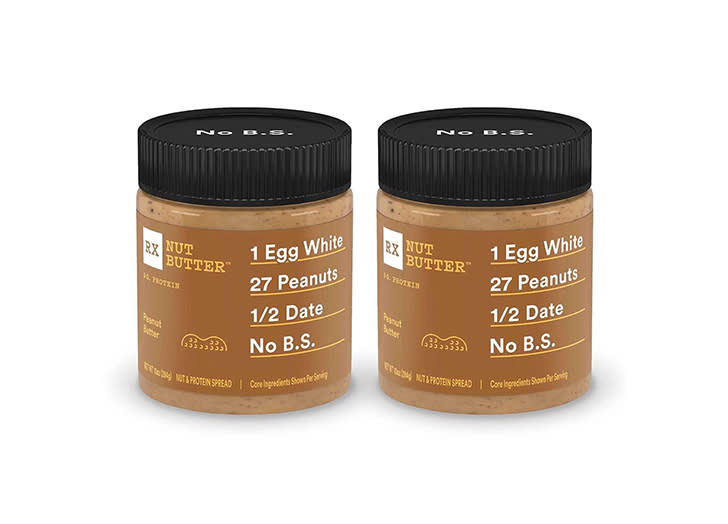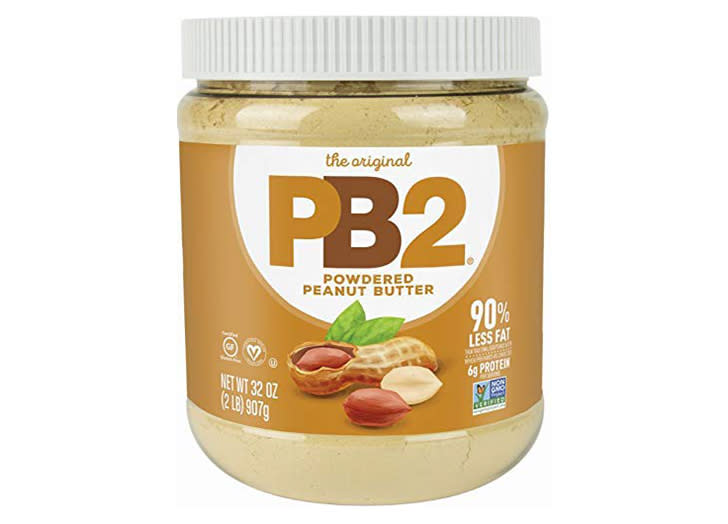The 10 Best Healthy Peanut Butter Brands, According to a Nutritionist

Whether you’re indulging in a late-night PB&J or lunchtime ants on a log, peanut butter is a reliable way to fill you up—while, dare we say, being much more crave-worthy than a bunch of baby carrots. Luckily, this condiment is pretty darn good for you, too. “Nut butters are a great source of plant-based protein,” says Dr. Felicia Stoler, DCN, a registered dietician, nutritionist and exercise physiologist. “The fat and fiber in peanuts help provide satiety, or feelings of fullness.” As long as the ingredient list is clean (peanuts should always be the first ingredient!), PB can easily be part of a healthy diet. Read on to learn its benefits, plus ten nutritionist-approved brands of healthy peanut butter and a guide to storing natural peanut butter.
RELATED: 15 of the Greatest Peanut Butter Recipes Ever
What Are the Health Benefits of Peanut Butter?
Our favorite thing about peanut butter is how filling (and affordable) it is. Add it to smoothies, oatmeal, noodle and sandwich recipes, or pair it with apples and celery for an extra boost of protein that’s sure to hold you over between meals. In addition to being protein-packed, peanut butter and nuts in general have a ton of health perks. “[Nuts] are dominant in monounsaturated and polyunsaturated fats, which are considered heart-healthy because they help lower LDL (aka ‘bad’) cholesterol,” says Stoler. “They also contain omega-6 fatty acids, as well as biotin, copper, niacin, folate, manganese, vitamin E, thiamin, magnesium and phosphorus.” Even better, peanuts specifically also contain fiber, since they’re legumes and grown underground.
What Ingredients Are in Healthy Peanut Butter?
To no one’s surprise, the first ingredient on the label should be peanuts. “Some stores make peanut butter fresh on location [by grinding] peanuts into nut butter or paste,” says Stoler. “Sometimes salt or other spices are added. In some instances, additional oil is also added to create a smoother texture.”
Some peanut butters are also sweetened naturally with sugar, molasses or honey, which will increase their sugar content. If that’s not an issue for you, Stoler still wouldn’t consider those naturally sweetened peanut butters unhealthy. However, she does suggest staying away from peanut butters that are sweetened with non-nutritive sweeteners, if you happen to come across any at the supermarket.

The 10 Best Healthy Peanut Butter Brands
1. Jif Natural Crunchy Peanut Butter
Per two-tablespoon serving: 190 calories, 16g fat, 8g carbs, 7g protein, 3g sugar, 3g fiber, 65mg sodium
Ingredients: peanuts, sugar, palm oil, 2 percent or less salt and molasses
This is one of Stoler’s go-to brands. Think of it as a natural take on big-brand peanut butter that’s sweetened, salted and contains oil. “My favorite sandwich—which I've turned a lot of people onto—is Jif or Skippy Natural PB with jelly, jam or spreadable fruit on Martins Whole Wheat Potato Bread,” she says. “It’s a thick, fluffy, soft and has 2 grams of fiber per slice.”
Try it: Grilled Peanut Butter and Jelly Sandwich

2. Skippy Natural Creamy Peanut Butter Spread
Per two-tablespoon serving: 190 calories, 16g fat, 6g carbs, 7g protein, 3g sugar, 2g fiber, 150mg sodium
Ingredients: roasted peanuts, sugar, palm oil, salt
This other classic brand is pretty on par with Jif, except it has 1 gram less fiber, higher sodium and no molasses. Skippy’s entire line of natural spreads are free of preservatives, artificial flavors and colors. Like most peanut butters, this one is also free of cholesterol and trans fat.
Try it: Rainbow Collard Wraps with Peanut Butter Dipping Sauce

3. Justin’s Classic Peanut Butter Squeeze Packs
Per one-pack serving: 210 calories, 18g fat, 6g carbs, 7g protein, 2g sugar, 1g fiber, 25mg sodium
Ingredients: dry roasted peanuts, palm oil
“I love that companies have started to make peanut butter and other nut butters in single-serve packs,” says Stoler, because of how easy they make maintaining portion control and snacking on the go. This popular non-GMO, gluten-free brand boasts no added sugar or salt, which explains its low sugar and sodium counts in comparison to bigger brands. Justin’s also uses sustainably sourced palm oil that doesn’t displace or harm orangutans in the areas where it’s harvested.
Try it: Overnight Oats with Peanut Butter and Banana

4. Crazy Richard’s All-Natural Crunchy Peanut Butter
Per two-tablespoon serving: 180 calories, 16g fat, 5g carbs, 8g protein, 2g sugar, 3g fiber, 0mg sodium
Ingredients: dry roasted peanuts
Phew, where do we begin? First of all, it doesn’t get cleaner than a one-ingredient label. Secondly, this pick is sugar-, oil- and salt-free, vegan, non-GMO and free of both BPA and cholesterol. Each jar of natural nut butter is packed with 540 kinds of raw peanuts, all naturally processed and grown in the United States. Just use a stirrer to blend the oil and peanut crunch together to make it easy to spread.
Try it: Spiced Apple Chips and Peanut Butter Toast

5. 365 by Whole Foods Market Organic Creamy Peanut Butter
Per two-tablespoon serving: 190 calories, 16g fat, 7g carbs, 8g protein, 2g sugar, 3g fiber, 0mg sodium
Ingredients: organic dry roasted peanuts
It’s nearly identical to Crazy Richard’s nutrition-wise, but significantly cheaper (and perhaps more accessible, if you live near a Whole Foods Market location). This organic, non-GMO PB is free of added sugar and salt, vegan and made with U.S.-grown peanuts. (BTW, you might think all peanut butter is vegan, but those that contain non-organic white sugar *technically* aren’t…just ask ketchup.) Similar to most natural peanut butters—especially those that are free of oils or emulsifiers—the peanuts’ natural oils will separate from the solids. But some Amazon reviewers claim that this particular one isn’t as hard to stir as other brands.
Try it: Soba Noodles with Peanut Sauce

6. RX Nut Butter Peanut Butter
Per two-tablespoon serving: 180 calories, 14g fat, 8g carbs, 9g protein, 3g sugar, 2g fiber, 110mg sodium
Ingredients: egg whites, dates, coconut oil, sea salt
There are a handful of peanut butters on the market that are naturally sweetened with dates, but this one also has the brag-worthy addition of egg white for extra protein. It’s non-GMO, keto-friendly (like most peanut butter), gluten-free and doesn’t contain any added sugar. Use it to make a peanut sauce for soba noodles or drizzle it over oatmeal to make it even more protein- and fiber-rich.
Try it: Warm Sesame Noodle Salad

7. Thrive Market Organic Creamy Peanut Butter
Per two-tablespoon serving: 180 calories, 16g fat, 5g carbs, 8g protein, 2g sugar, 3g fiber, 5mg sodium
Ingredients: organic peanuts
We love the concept of this squeezable pouch. You can smooth it over toast, stir it into a smoothie bowl or squeeze it onto apple slices just as easily as you can slurp it straight from the pouch (c’mon, it’s the same as eating it from the jar, minus the spoon). Just be sure to knead the pouch to combine the oil and solids before indulging. Thrive Market’s PB is organic, non-GMO, vegan and free of preservatives, gluten and added sugars and sweeteners.
Try it: Cocoa Peanut Butter Granola

8. Spread the Love Naked Organic Peanut Butter
Per two-tablespoon serving: 180 calories, 15g fat, 6g carbs, 7g protein, 1g sugar, 2g fiber, 0mg sodium
Ingredients: organic peanuts
This California brand prides itself in its all-natural, small-batch peanut butter, which is vegan, gluten-free, non-GMO and free of salt, sugar, palm oil and preservatives. Producing the PB in small batches means that the brand can also steer clear of any unnecessary food processing and stabilizers. Spread the Love is family-owned and frequently works with nonprofits, so even though this peanut butter is a bit of a splurge, it’s well worth it.
Try it: 3-Ingredient Peanut Butter Cookies

9. Smucker’s Natural Creamy Peanut Butter
Per two-tablespoon serving: 190 calories, 16g fat, 7g carbs, 8g protein, 2g sugar, 3g fiber, 110mg sodium
Ingredients: peanuts, one percent or less salt
You know and love this brand for its famous Concord grape jelly. What better pairing for it than this natural peanut butter that has a clean ingredient list and solid nutrition stats? It’s free of hydrogenated oils, non-GMO, vegan and gluten-free to boot. Serve it with fruit, spread it on a sandwich or dig into the jar to your heart’s content—we won’t tell.
Try it: Peanut Butter Dip

10. PB2 Original Powdered Peanut Butter
Per two-tablespoon serving: 60 calories, 1.5g fat, 5g carbs, 6g protein, 2g sugar, 1g fiber, 90mg sodium
Ingredients: roasted peanuts, sugar, salt
Instead of using the spreadable stuff, Stoler leans on powdered peanut butter for smoothies, yogurt, soups and sauces. It’s great for blending or shaking, since it’s not as thick and sticky as peanut butter (meaning you won’t have to scrape the blades and blender clean every few seconds to make your smoothie or protein shake). Not only is PB2’s powder non-GMO and gluten-free, but it has 90 percent less fat and significantly fewer calories per two-tablespoon serving than most other brands of peanut butter.
Try it: Salted Peanut Butter Cup Smoothie
How to Store Natural Peanut Butter
Standard big-brand peanut butters will last in the dark, cool pantry for about six to nine months closed or two to three months once opened. Refrigerating it extends its shelf life, but the cold definitely makes it less spreadable.
Natural peanut butter is even less spreadable when cold, since it’s unrefined and contains nothing but ground peanuts and sometimes salt without preservatives or hydrogenated oils to make it extra smooth. Many brands advise refrigerating it after opening, but natural peanut butter can last up to a month on a cool, dark shelf. (P.S.: Storing your natural peanut butter upside-down in the pantry will help evenly distribute the oil instead of letting it pool at the top.)
If you’ll likely devour the whole jar within a month, feel free to leave it at room temperature. If it takes you longer to finish, keep it in the fridge for up to six months instead so the oils don’t spoil. Just be sure to stir the separated oil back into the peanut butter between uses—it’s tougher to reincorporate once the PB gets cold and hard.
RELATED: Should Peanut Butter Be Refrigerated?
PureWow may receive a portion of sales from products purchased from this article, which was created independently from PureWow's editorial and sales departments.

